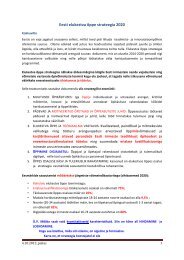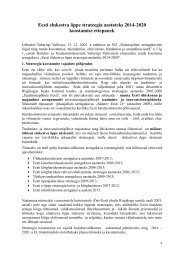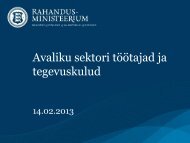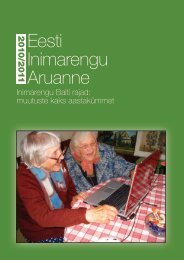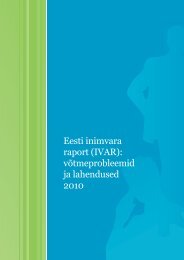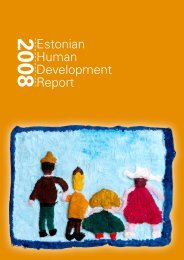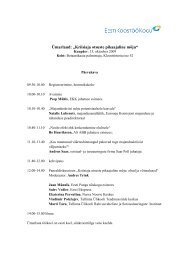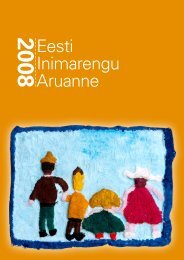DEVELOPMENT
The pdf-version - Eesti Koostöö Kogu
The pdf-version - Eesti Koostöö Kogu
Create successful ePaper yourself
Turn your PDF publications into a flip-book with our unique Google optimized e-Paper software.
the HDI’s content has also been hindered by other additional<br />
factors. For instance, the HDI does not measure the<br />
capabilities related to political freedoms, human rights,<br />
environmental sustainability and the pursuit of happiness.<br />
Attempts to include politically sensitive measures<br />
in the Human Development Reports have caused the<br />
countries which feel that they are affected to voice their<br />
objections to the UN, and have resulted in discussions at<br />
the General Assembly. In 1992, an attempt to construct<br />
an index of political freedoms even resulted in the continuity<br />
of the Human Development Report’s publication<br />
being put at risk. On the other hand, for example, the<br />
construction of an environmental friendliness indicator<br />
has been obstructed by the great conceptual differences<br />
of opinion among the theoreticians (Klugman, Rodriguez,<br />
Hyung-Jin 2011).<br />
At this point, putting aside the disputes about the<br />
reasoning behind the choice of indicators and the calculation<br />
methodology employed in computing the HDI, we<br />
can, based even on the aforementioned, agree with the<br />
assessment by the spiritual father of the HDI, Amartya<br />
Sen (Sen 2003), that the HDI is an imperfect measure of<br />
capabilities. The concept of capability itself has such a<br />
broad meaning, being rich and abstract, that no matter<br />
what summarised measure is used to compare a large<br />
number of countries, it will be accompanied by much<br />
generalising and simplifying approximating (Klugman,<br />
Rodriguez, Hyung-Jin 2011).<br />
According to the same authors, (Klugman, Rodriguez,<br />
Hyung-Jin 2011), who are involved in using the<br />
indices in the Human Development Reports, the measurement<br />
of capabilities based on the HDI clearly differs<br />
from the measurement of well-being. Unlike the function<br />
of measuring well-being, the capability index supposedly<br />
does not require maximisation, i.e. the need to necessarily<br />
aggrandise. Since the HDI, as an index of capabilities,<br />
describes an aggregate of freedoms that people are able to<br />
use in the execution of their highly-valued life plans, then<br />
the expansion of these freedoms is one of the goals of<br />
society, but this does not have to be the only goal (Klugman,<br />
Rodriguez, Hyung-Jin 2011).<br />
Yet, regardless of its creators’ continued attempts<br />
to focus on capabilities and the concepts of freedom of<br />
choice related thereto, it seems that the HDI has started<br />
to live its own life, which is not very firmly linked to<br />
the initial theoretical reasoning. The ranking and the<br />
grouping of countries based on the level of development<br />
in the Human Development Reports, the calculation of<br />
the average annual growth rates of the Human Development<br />
Index and its sub-indices, and the analyses of the<br />
advancements in the country rankings testify to the fact<br />
that the maximisation of the Human Development Index<br />
is actually considered to be important.<br />
In practice, the Human Development Index is<br />
treated as a simplified, and therefore significant, indicator<br />
that has been freed of any political appendages, and is<br />
thereby acceptable to countries with all types of regimes.<br />
But, well-being, as a reflection of the satisfying of human<br />
needs, in the context of the concept that is widely in use<br />
in the social sciences, consisting of health, learnedness,<br />
as well as income, traditionally has a value of its own,<br />
and the aforementioned are, in regards to well-being,<br />
Table 1.1.1<br />
Estonia’s position in the Human Development Index,<br />
based on the 2010 calculation method, 1990-2012<br />
1990<br />
2000<br />
2005<br />
2006<br />
2007<br />
2008<br />
2009<br />
2010<br />
2011<br />
24 37 30 28 28 30 30 33 33 33<br />
Source: based on UNDP 2013<br />
Table 1.1.2<br />
Human Development Index and his basic indicators in<br />
selected countries, 2012<br />
Very high human development<br />
High human development<br />
Rank<br />
Country<br />
Life expectancy<br />
at birth (years)<br />
Mean years of<br />
schooling<br />
Expected years of<br />
schooling (years)<br />
Gross national income<br />
(GNI) per capita<br />
(2005 PPP US dollars)<br />
2012<br />
Human development<br />
index<br />
1 Norway 81.3 12.6 17.5 48,688 0.955<br />
2 Australia 82.0 12.0 19.6 34,340 0.938<br />
3 United States 78.7 13.3 16.8 43,480 0.937<br />
4 Netherlands 80.8 11.6 16.9 37,282 0.921<br />
5 Germany 80.6 12.2 16.4 35,431 0.920<br />
6 New Zealand 80.8 12.5 19.7 24,358 0.919<br />
7 Ireland 80.7 11.6 18.3 28,671 0.916<br />
8 Sweden 81.6 11.7 16.0 36,143 0.916<br />
9 Switzerland 82.5 11.0 15.7 40,527 0.913<br />
10 Japan 83.6 11.6 15.3 32,545 0.912<br />
...<br />
12 South Korea 80.7 11.6 17.2 28,231 0.909<br />
...<br />
15 Denmark 79.0 11.4 16.8 33,518 0.901<br />
...<br />
21 Finland 80.1 10.3 16.9 32,510 0.892<br />
22 Slovenia 79.5 11.7 16.9 23,999 0.892<br />
...<br />
28 Czech Republic 77.8 12.3 15.3 22,067 0.873<br />
...<br />
33 Estonia 75.0 12.0 15.8 17,402 0.846<br />
35 Slovakia 75.6 11.6 14.7 19,696 0.840<br />
...<br />
37 Hungary 74.6 11.7 15.3 16,088 0.831<br />
...<br />
40 Chile 79.3 9.7 14.7 14,987 0.819<br />
41 Lithuania 72.5 10.9 15.7 16,858 0.818<br />
...<br />
44 Latvia 73.6 11.5 14.8 14,724 0.814<br />
...<br />
51 Uruguay 77.2 8.5 15.5 13,333 0.792<br />
...<br />
55 Russia 69.1 11.7 14.3 14,461 0.788<br />
...<br />
62 Costa Rica 79.4 8.4 13.7 10,863 0.773<br />
...<br />
Source: UNDP 2013<br />
Estonian Human Development Report 2012/2013<br />
9



